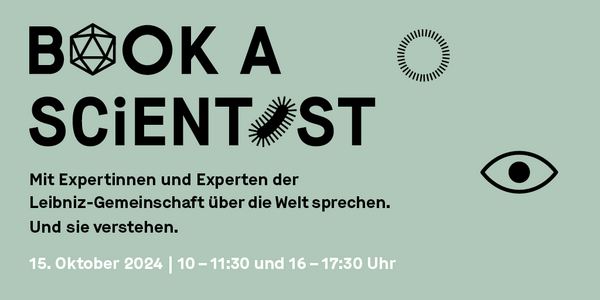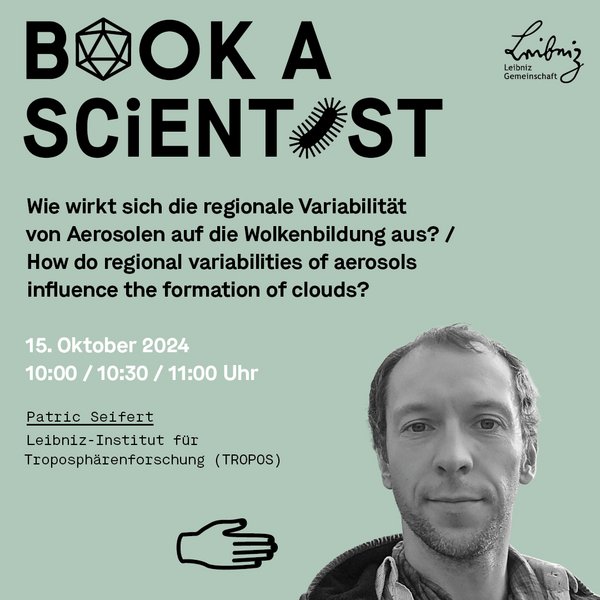Book a Scientist on 15 Oktober 2024
Speed dating with science
If you don't ask, you stay stupid - as Sesame Street already knew. With ‘Book a Scientist’, you have the chance to spend 25 minutes talking to an expert from the Leibniz Association and ask everything you've always wanted to know about your favourite topic.
When?
The individual, 25-minute one-on-one talks will take place online on 15 October 2024 between 10-11.30 am and 4-5.30 pm.
How?
To book a free virtual meeting with a Leibniz expert, click on the date of your choice in the list of topics below (dates that have already been allocated are highlighted in grey).
After you have booked an appointment, you will receive an e-mail and must confirm your entry. You will then receive an appointment confirmation from us. You will receive the link to the virtual meeting point with the appointment confirmation or at the latest with the appointment reminder, which is sent out one week before the event. If you have any questions about the booking or the format, you can also contact us at any time by e-mail at veranstaltungen(at)leibniz-gemeinschaft.de.
What?
Choose from over 100 topics in the following areas for your interview:
Health, ageing & nutrition
People, nature & ecosystems
Economy, labour & technology
Language, education & open science
Literature, Culture & History
Politics, Society & Religion
Media, Journalism & Internet
Environment, mobility & energy
Space, galaxies & astrophysics
How do regional variabilities of aerosols influence the formation of clouds?
Language: German / English
Discussion partner: Patric Seifert
Time slot: 15.10.24 10:00-10:25 / 10:30-10:55 / 11:00-11:25
Patric Seifert joined the ground-based remote sensing group at TROPOS in Leipzig in 2006, where he completed his Master's degree on aerosol effects on the formation of tropical cirrus clouds. Since then, he has been working on ground-based and space-based remote sensing of aerosols and clouds with various active sensors, mainly lidar and cloud radar, as well as supporting passive sensors.
Saharan dust in the air and its impact on weather and climate
Language: German / English
Dialogue partner: Moritz Haarig
Time slot: 15.10.24 10:00-10:25 / 10:30-10:55 / 11:00-11:25 / 16:00-16:25 / 16:30-16:55 / 17:00-17:25
Every year, large quantities of dust from the Sahara enter the atmosphere. There it influences the formation of clouds and precipitation. Using lidar technology, we can measure how much dust is present at what altitude. Our lidar devices are not only located in Leipzig, but also on the Cape Verde Islands, in Cyprus and in Tajikistan. The ESA satellite EarthCARE, which also measures dust clouds from space, was launched in May.
Junior research group leader Lidar measurements of dust and other aerosols in the atmosphere



